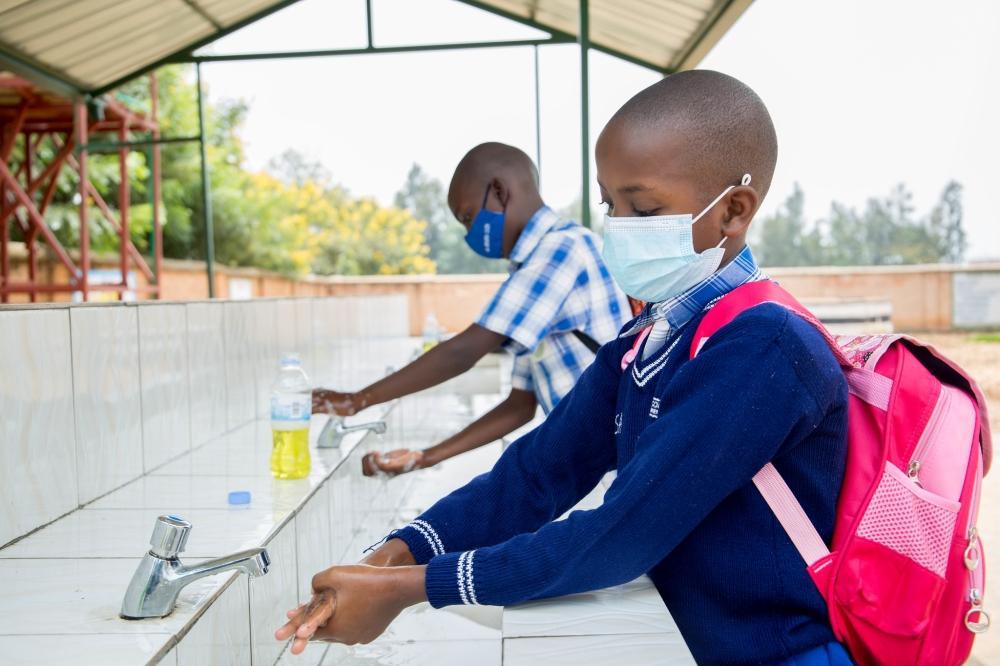Africa-Press – Rwanda. Handwashing is one of the simplest and most effective ways to prevent the spread of diseases and save lives, according to the World Health Organization (WHO).
Proper hand hygiene can reduce transmission of infectious diseases such as diarrhea, respiratory infections, and healthcare-associated infections.
Despite its vital role in public health, the culture of handwashing appears to be waning in Rwanda. In many public spaces, including markets, schools, and bus stations, handwashing stations are often broken, dry, or lack soap altogether.
Diarrhea is the leading cause of morbidity and mortality among children under five years old. According to the Rwanda Demographic and Health Survey (RDHS) 2019–2020, the national prevalence of diarrhea among children under five is approximately 14.3%.
UNICEF estimates that approximately 500,000 deaths annually are linked to diarrhea or acute respiratory infections that could have been prevented with proper hand hygiene. Globally, 2.3 billion people—nearly three in ten, lack access to basic handwashing facilities with water and soap at home.
In sub-Saharan Africa, 7 percent of healthcare facilities have no hand hygiene services, while over 460 million schoolchildren attend schools without any hygiene facilities.
Rwanda made progress during the COVID-19 pandemic, installing handwashing stations at entrances of churches, schools, markets, and other public buildings. For a time, handwashing became routine, but this momentum has since faded.
“Hand hygiene is not a complicated intervention; it is inexpensive, accessible, and incredibly effective. Unfortunately, it hasn’t become a consistent habit in our communities. People wash their hands only when there is a crisis,” said Vincent Mutabazi, an epidemiologist based in Kigali.
According to WHO, washing hands with soap and water removes germs more effectively than water alone. When hands are not visibly dirty, alcohol-based hand rubs are recommended. Regular handwashing remains one of the most powerful tools for infection prevention in both healthcare settings and everyday life.
At Nyarugenge market in Kigali, Martin Habarurema was among the few observed washing his hands before entering the building.
“It’s important to wash hands at all times because hygiene is part of life, but we tend to ignore it until there is a health scare. We don’t take preventive measures seriously,” he told The New Times.
Habarurema noted that communities should not wait for another outbreak to remember that hygiene matters, noting that “clean hands save lives, and that should never be forgotten.”
Jean Claude Nsanzumuhire, a Kigali resident, noted that handwashing stations, once widespread in public places, are now often broken or lack water. “If there’s no water after using the toilet, people simply walk away without washing their hands, unintentionally spreading germs.”
Valentine Kamaliza, a local entrepreneur, admitted: “Truthfully, I don’t always maintain proper hygiene. We only start washing hands regularly when there’s an outbreak because we’re scared. But once the danger passes, we forget everything.”
Dr. Mutabazi cautioned that such attitudes could reverse the health gains Rwanda has achieved over the years.
“We don’t need to start from scratch since the infrastructure is already there. What we need is to ensure it remains functional and that people use it,” he said.
He added that behavior change is not achieved through fear alone but requires sustained education and community engagement.
“During consistent public health campaigns in the pandemic, we saw a clear drop in hygiene-related illnesses such as diarrhea. This proves handwashing works, though unfortunately, the practice has declined.”
The U.S. Centers for Disease Control and Prevention (CDC) recommends washing hands at critical times, before preparing food, after using the toilet, after sneezing or coughing, after caring for the sick, and after touching animals or garbage. These simple habits dramatically reduce infection risk.
To ensure lasting change, Dr. Mutabazi stressed the importance of targeting children and youth.
“We focus on schools and youth centers because young people are more adaptable. If they grow up washing their hands regularly, they will carry those habits into adulthood. Adults are harder to influence.”
He explained that the decline in hand hygiene is not due to lack of knowledge but lack of commitment, emphasizing that these are affordable solutions that must be prioritized as part of everyday life.
Dr. Mutabazi also highlighted the need for sustained responsibility, not only from people but from institutions tasked with maintaining handwashing infrastructure.
“While handwashing has proven effective, what we need now is consistent practice, making it a permanent public health priority rather than a temporary response.”
For More News And Analysis About Rwanda Follow Africa-Press






